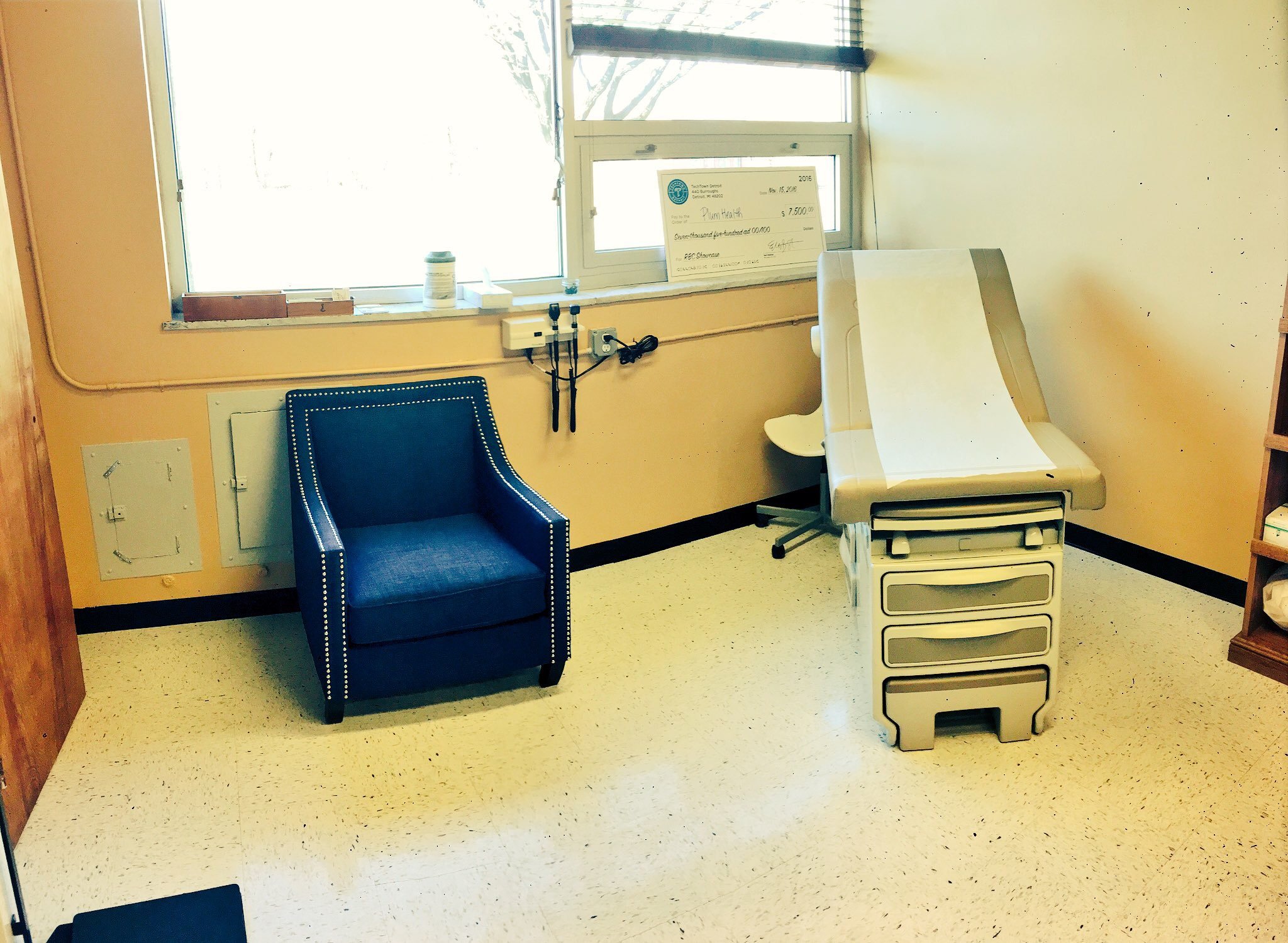Plum Health Blog
Don't Further Entrench an Already Broken System
Dear Congressional Representatives, Leaders in the AAFP, and all of those concerned with improving the health of Americans,
I’ve recently become aware of a part of the Alexander-Murray health reform bill that is concerning for the Direct Primary Care (DPC) movement, my practice and the patients that I care for in Southwest Detroit.
The bill includes a provision that mandates all High Deductible Health Plans cover an allotted primary care benefit. As written currently, the Alexander-Murray bill will cover “3 office visits per year” but many organizations, including the American Academy of Family Physicians (AAFP), are pushing to expand that.
While this may sound like a nice perk for patients, it only further traps patients and their primary care doctors in a broken system that undervalues primary care. It reinforces the notion that government and insurance companies must micromanage our dollars and decisions.
Forcing patients to pre-pay for a “primary care benefit” with no out-of-pocket costs will have a few detrimental effects. First, it will almost certainly increase the up-front costs of already skyrocketing health insurance plans. It will also dissuade patients from taking a proactive approach to managing their own health and health care, instead pushing them to be managed by an insurance plan or government programs. Finally, this pre-paid primary care benefit will discourage people from joining Direct Primary Care Practices, a promising practice model that is already achieving the quadruple aim: improving population health, increasing patient satisfaction, reducing per-capita health care spending, and improving physician and staff satisfaction while practicing medicine.
Furthermore, the Alexander-Murray bill fails to address the Health Savings Account (HSA) issue with regards to Direct Primary Care membership fees, something that my DPC doctor colleagues and I have been advocating for over the last few years.
My recommendation at this time would be to advocate for the Primary Care Enhancement Act (SB 1358), which would address the above HSA issue and not further entrench an already broken primary care delivery model.
In closing, Direct Primary Care is an innovative health care delivery model that has promise for achieving the quadruple aim on a nationwide basis. There are nearly 1,000 primary care doctors already practicing or on the cusp of engaging in this model. This is an opportunity to help us grow this DPC movement, to help us better serve our patients in this innovative way, and to potentially heal a broken primary care system in America. Help us reach our goal.
Thank you for your time and consideration,
- Dr. Paul Thomas, MD with Plum Health DPC in Detroit, Michigan
Direct Primary Care Doctors Have More Time
Have you ever had this experience: a doctor tells you that you have condition "X" with treatment "Y", they then proceed to leave the room. A few moments later, the medical assistant hands you a pamphlet explaining condition "X" and treatment "Y", saying "thank you so much and have a great day"?
Questions start to pop in your head - do they know that I've already tried medication "Z"? What are the common side effects of treatment "Y"? Perhaps you've then asked the medical assistant, who then tries to pull the doctor out of the next patient's room.
This can be extremely frustrating, and for good reason. When you see the doctor, you want to have a plan. Further, you want to understand this plan, the side effects of treatment, the potential costs involved, and other options if this option fails.
Direct Primary Care doctors have more time to spend with their patients. We use this time to explain treatment plans, from why we chose a specific medication to what you should expect and when it's time to make that referral.
As an aside, I was discussing this with some of my Direct Primary Care doctor colleagues: should we be sending information to our patients via digestible video segments?
My answer is as follows:
Should Direct Primary Care Doctors make videos for their patients? In short, maybe. If you are consistently repeating information for your patients, it might be a good idea for you to make a short "explainer" video. For example, the difference between strep throat and a viral sore throat or a preferred diet method, or what to do in the case of a tick bite.
If you are seeing common ailments, it may make sense to make videos explaining the symptoms, but you became a Direct Primary Care Doctor for a reason! You wanted to have more time to discuss issues with your patients, more time to explain why you are using that medication or why you are pursuing that course of action.
It would make more sense to make videos for a larger health system. If the videos are really high quality, the doctors who have less time to explain themselves can use them to give patients the information that they would want to convey themselves, but don't have enough time to convey.
Thanks so much for reading, and have a great day,
Dr. Paul Thomas with Plum Health Direct Primary Care
MedHealth Summit at TechTown
Yesterday, I had the opportunity to attend the MedHealth Summit at TechTown. It was a great event that brought together healthcare organizations and innovators. Their aim was to catalyze the development of solutions and adoption of technologies that use health IT, digital platforms, and medical devices to solve key healthcare challenges in SE Michigan and Southwest Ontario.
This was a great event in that it encouraged cross-border collaboration, something that we don't have enough of in the Healthcare industry. The summit also served as a platform for collaboration and facilitated an environment conducive to networking with colleagues working on innovative ideas in this space.
The event concluded with a pitch competition for those creating scaleable, pre-market platforms and devices. The winner was Rob Zondervan and his company created SteriDev, a pre-market piece of medical equipment that allows doctors and surgeons to take their iPhones into a sterile operating room.
SteriDev won $10,000 in grant money via the pitch competition and they plan on making the product in Michigan. This device would definitely be useful for taking photos of intra-operative findings for orthopedic surgeons and interventional radiologists, and they have a reasonably-sized market to pursue.
A special thanks to Paul Riser and his team of collaborators for setting everything up and creating a great event!
Thanks for reading and have a great day,
Paul Thomas, MD
An Interview with Dr. James Blessman
Today, I attended the monthly Wayne County Medical Society meeting. There were several topics discussed and my mentor Dr. James Blessman brought up an upcoming lecture. Dr. Joel Fuhrman will be at the Detroit School of Arts on February 2nd, 2017 at 6 pm (doors at 5 pm). There's more information at this link. Full video of the interview is below!
During the meeting at the Wayne County Medical Society of Southeast Michigan, several topics were discussed. Currently, the Detroit Public School system stresses abstinence first in their curriculum. This does not mean that the DPS teaches abstinence only, so a group of Medical Students from Wayne State University School of Medicine came to the meeting to clarify the curriculum and obtain the Medical Society's support.
Additionally, the Medical Society discussed burnout and health habits among physicians, the recent increase in Hepatitis A cases in Wayne County, and the recent publication of a Human Trafficking Awareness video. As for the Hepatitis A, you can receive a shot for $10 via the Wayne County Health Department in Wayne, Michigan. At Plum Health, we wholesale the Hepatitis Vaccine for about $70 and in the insurance world, coverage varies depending on which private insurance company you use.
Dr. Blessman also brought up Joel Fuhrman, MD and his upcoming lecture at the Detroit School of Arts on 123 Selden Street in Midtown. The event will be held on February 2nd at 6 pm. Dr. Fuhrman is a leading thinker in the area of medical nutrition, with several best-selling books on the subject. He has been noted to say that the foods that you should eat include the "GBOMBS", or Greens, Beans, Onions, Mushrooms, Berries, and Seeds. The main point is that you want to have more micronutrients in the foods that you consume.
Thanks for reading, and watch the video below!
- Paul Thomas, MD
Plum Health + Vitamin D
Vitamin D deficiency can be a big problem in the winter months, especially if you live up in Michigan! At Plum Health, we delivery direct primary care services, meaning that we can get you wholesale medications and at-cost laboratory services, including Vitamin D Levels and Vitamin D supplements.
You should have a vitamin D level of 20 - 50 ng/mL - some experts in the field recommend 20 - 40 ng/mL as the appropriate range, others recommend 30 - 50 ng/mL as the best range. However, experts agree that a Vitamin D level of less than 20 ng/mL can lead to problems with skeletal health.
Having a sub-optimal vitamin D level can lead to osteoporosis, an increased risk of falls and possible fractures. Additionally, having a low vitamin D level can put you at risk for immune problems and cardiovascular problems.
We make vitamin D in our skin, and this production is aided by sunlight. The American Academy of Family Physicians (AAFP) noted that "humans typically obtain 90 percent of vitamin D from sunlight". Unfortunately, because of low sunlight levels in the winter, our Vitamin D production ceases in temperate areas like Detroit, Edmonton, and Boston.
Furthermore, you are at an increased risk of having low vitamin D levels if you are sedentary, if you have dark skin, if you are obese, if you are over 65 years of age, or if you take medications that alter Vitamin D metabolism, like steroids or seizure medications.
So, unless you are a young, active snowbird, it is wise to take a vitamin D supplement to offset your lost productivity in the winter months. According to the AAFP, a 3.5 ounce piece of fresh, wild-caught salmon has roughly 600 - 1,000 international units of vitamin D. Other sources of dietary vitamin D include tuna with 230 IU's for every 3.6 ounces consumed and milk at 100 IU's for every 8 ounces consumed.
If you'd rather get your vitamin D in pill form, Vitamin D3 or cholecalciferol comes in doses of 400, 800, 1,000 or 2,000 IU's. These can be purchased over the counter, but it is best to talk to your primary care doctor before deciding on which dose is appropriate for you.
Thanks for reading and have a great day!
Paul Thomas, MD, Family Medicine doctor in Detroit, Michigan
Plum Health + Free Market Principles
At Plum Health, we leverage free market principles to deliver affordable, accessible healthcare services. We do this by using cash to purchase medications at wholesale prices. We also work with imaging service centers for at-cost imaging and lab companies for at-cost labs.
Because we pay cash for these services, they cost less. These services are often 80 - 90% less expensive than using your insurance to purchase the same exact services.
I like to use the auto insurance analogy to clarify this principle. Typically, you use your auto insurance to repair your car in the case of an accident. You don't call your auto insurance provider when you need to rotate your tires, change your oil, or put gas in your car. You buy these services on the free market because you can shop around and find the best prices.
If you did use your auto insurance to pay for oil, gas, and tire rotation, you would not only pay more for your insurance policy, but the prices for these individual services would increase because of the middle men that have to handle your money.
Similarly, the health care services provided by a primary care doctor (like me!) are relatively inexpensive. Like it costs next to nothing to check a blood pressure, listen to your heart and lungs, and fill a prescription. So I make the prices of our services transparent so that you understand exactly what you're getting and exactly how much you will be paying for those services.
Because you now have a known cost for the services that we provide, you can shop around, price compare and decide for yourself what makes the most sense for you. For example, let's say you need that MRI of the Cervical Spine. With Plum Health, you can decide if it's better to pay with cash or to use your insurance.
Just this week we ordered an MRI of the Cervical Spine for one of our members. About 4 years ago, he paid $2,000 for this MRI of the C-Spine. Through our contract with a local imaging company, we are able to deliver the same test for about $363.
To further this example, let's say your insurance coverage is 80/20 for services, meaning that your insurance pays 80% of the cost and you pay 20% of the cost. If you buy that MRI via your insurance company for $2,000, they will pick up 80% of the cost, or $1,600, and you will have to pay the remaining 20% of the cost, or $400. If you go this route, you may have just overpaid by $37.
That may not be a lot to overpay, but for families on a tight budget, every dollar makes a difference. We like to say that we can show you the true value of your health care dollar, and it's important for us to save you money for your health care services. When I took the Hippocratic Oath to become a doctor, I said "First do no harm", and I take that to mean financial harm as well.
If you'd like to learn more about how we use our free market principles to save you money on your healthcare services, don't hesitate to call me at 313.444.5630.
Also, this clip is taken from a longer interview that we did with PodBros! Check out their website and rate them on iTunes!
Thanks for reading!
- Paul Thomas, MD
Making Healthcare Hassle-Free
Plum Health is the first Direct Primary Care practice in Detroit, Southeast Michigan and Wayne County. It makes healthcare hassle-free. We diagnose, treat, refill prescriptions, refer you to curated specialists, and make all of the frustrations in healthcare disappear.
Because you have a doctor who is available and responsive, you never have to worry about being on your own or trying to figure out if something’s terribly wrong. People sometimes get scared and rush to the hospital, but a $6,000 ER visit can be financially devastating.
One avoided ER visit pays for 10 years of care at Plum Health DPC. Plus, you get peace-of-mind, knowing your doctor is always available. To schedule an appointment, check out our scheduling link. To find out more, or if you have questions, call 313.444.5630.
- Paul Thomas MD
Removing the barriers between you and your doctor.
New Video for Plum Health DPC
We are excited to release our new video! At Plum Health DPC, we deliver affordable, accessible healthcare services to Detroit and beyond. You can sign up here.
A big thank you to Josh at Soul Media for writing, filming and editing the piece.
- Paul Thomas, MD
Plum Health DPC + Detroit SOUP
I am very excited that Plum Health DPC has been invited to pitch at Detroit SOUP on Sunday, September 25th at 5 pm at the Jam Handy, 2900 E Grand Blvd, Detroit, MI 48202.
The Detroit SOUP is a wonderful organization, and you can read more about what they do here. Succinctly, SOUP curates a monthly dinner where four ideas are shared and voted upon by the people who attend. Detroit SOUP states it this way:
"Detroit SOUP is a microgranting dinner celebrating and supporting creative projects in Detroit. For a donation $5 attendees receive soup, salad, bread and a vote and hear from four presentations ranging from art, urban agriculture, social justice, social entrepreneurs, education, technology and more. Each presenter has four minutes to share their idea and answer four questions from the audience. At the event, attendees eat, talk, share resources, enjoy art and vote on the project they think benefits the city the most. At the end of the night, we count the ballots and the winner goes home with all of the money raised to carry out their project. Winners come back to a future SOUP dinner to report their project’s progress."
Plum Health DPC will have a four minute time slot to present our idea for affordable, accessible healthcare services in the City of Detroit and beyond. If you want to see better healthcare options in the City and Metro region, if you care about creating a valuable and sustainable healthcare alternative, please come out and support us!
The Facebook event can be found here, September 25th Detroit SOUP.
Thank you!
- Paul Thomas, MD
The Basics of Direct Primary Care
Direct Primary Care is a relatively new idea, so it is worth discussing the founding principles.
Direct Primary Care (DPC) is an innovative alternative payment model for primary care being embraced by patients, physicians, employers, payers and policymakers across the United States. The foundation of DPC is an enduring and trusting relationship between a patient and their primary care doctor.
Empowering this relationship is the key to achieving superior health outcomes, lower costs and an enhanced patient experience. DPC fosters this relationship by providing excellent customer service.
In terms of customer service, the health care system in the United States has failed. There are so many frustrations from the perspective of a customer: long wait times to get an appointment, long wait times at the office, unresponsive doctors, as well as confusing and unclear pricing.
Direct Primary Care addresses these shortcomings of the fee-for-service system head on. When you enroll in a DPC practice, you will have your doctor’s cell phone number, email address, and the assurance that you can have a same-day or next-day appointment, guaranteed.
In addition, DPC enables unhurried interactions – you won’t feel like you’re being rushed out the door with your DPC doctor. These extended visits allow for discussions to assess lifestyle choices, behaviors, and treatment decisions that maximize long-term health and wellbeing.
How is this possible? Direct Primary Care doctors typically limit their practice size to 500 members. This relatively small panel size allows doctors to be committed to their patients, to deliver excellent customer service.
To become a member of Plum Health Direct Primary Care in Detroit, Michigan, check out our contact page, here.
- Paul Thomas, MD
The Doctor-Patient Relationship
Taking care of our members, our patients, our customers is at the heart of our business. When we think about our logo and when we think about a Plum, we think of two overlapping circles. At Plum Health DPC, there is more overlap for our patients and our doctors than in the typical or traditional model of care.
This greater overlap is intentional. We build deep relationships with our patients, which helps us identify and treat the root cause of an illness or ailment. Our relationship helps us maximize engagement, patient experience and satisfaction.
Pictured is an alternative logo for Plum Health DPC, one that we considered carefully because it exemplifies that principle of greater overlap between doctor and patient.
- Paul Thomas, MD
So, Why Plum?
When people talk with us, they often ask: "So, why Plum?"
For us, a Plum is healthy. It fits in your hand. It's purple. It's simple. It's two overlapping circles.
A Plum is a healthy food, and at Plum Health DPC we know that taking better care of yourself begins with what we eat and how we move. The choice of a Plum is inspired by bike rides to Eastern Market, and finding those healthy foods. At Plum Health, we can direct you to healthy resources throughout Detroit and Metro Detroit.
A Plum is simple, it fits in your hand, and you can take it with you. At Plum Health DPC, we have set out to simplify health care for our members. We aim to eliminate the frustrations in the fee-for-service system like waiting too long to see your doctor, confusing billing, and co-pays.
You can also take our services with you. Say you're traveling and something comes up, we can help to guide you through whatever problems you face. Maybe it's talking you through a head cold, reviewing a management plan, or sending a medication that you forgot at home to the pharmacy nearest you.
A Plum is purple. At Plum Health DPC, we proudly serve and welcome people of all backgrounds. All ages, stages, races, ethnicities, and orientations are welcome. Additionally, our price points for individuals are less than a typical cell phone bill. Our price points for families are less than a typical cable bill. This allows us to serve people of all income levels.
Finally, a Plum can be drawn with two overlapping circles. To us, this symbolizes the doctor - patient relationship. At Plum Health, there is more overlap in the relationship between doctor and patient. We believe that having a closer relationship with your doctor can allow you to live a healthier and happier life.
- Paul Thomas, MD























